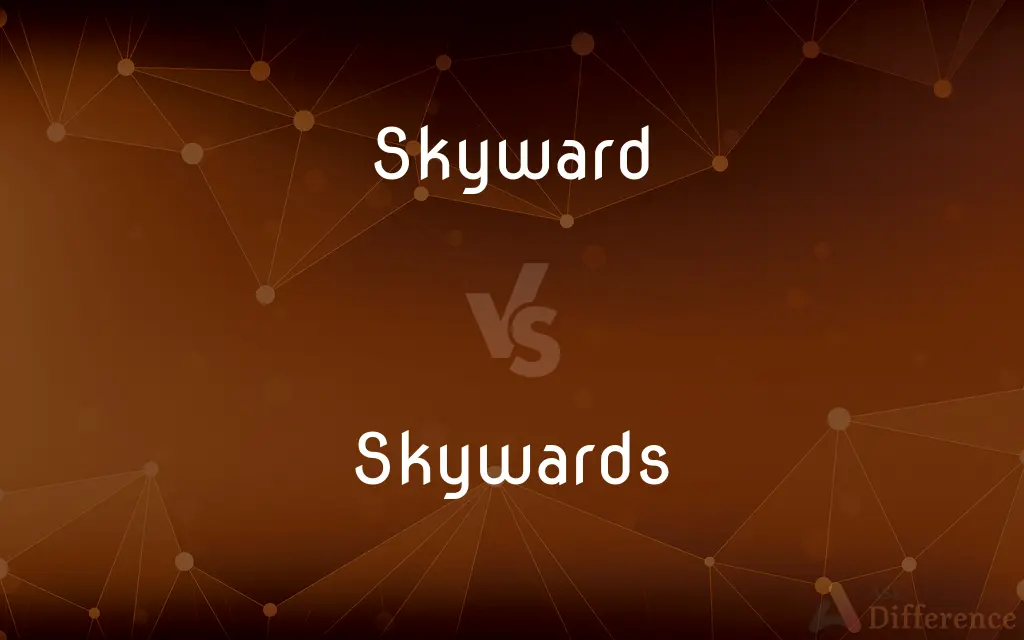
Introduction to Skyward and Skywards
Have you ever looked up at the sky and wondered about the direction towards which everything seems to stretch infinitely? The words “skyward” and “skywards” may sound similar, but they hold distinct meanings that can shed light on our language’s nuances. Let’s unravel the fundamental differences between these terms and explore how understanding them can elevate your communication skills to new heights.
The Difference in Meaning
When it comes to the terms “Skyward” and “Skywards,” understanding their meanings is crucial. Let’s delve into the nuances that set these words apart.
Let’s explore the definition of “Skyward.” This word refers to a direction towards the sky or upwards in a vertical manner. It signifies movement or orientation towards the heavens above.
On the other hand, “Skywards” is used more as an adverbial form of ‘skyward.’ It indicates a motion or action directed skyward.
While both terms relate to upward movements, their usage differs slightly based on context. Understanding this discrepancy can enhance your language skills and communication effectiveness.
A. Definition of Skyward
When we talk about “skyward,” we are referring to a direction, an upward movement towards the sky. It signifies looking or moving upwards, often in a metaphorical sense of aspiration and growth.
The term can also evoke feelings of wonder, freedom, and expansion as one gazes towards the endless expanse above. Whether it’s a bird soaring effortlessly or a skyscraper reaching for the clouds, going skyward symbolizes striving for something higher.
In literature and poetry, “skyward” is frequently used to add imagery and depth to descriptions, painting vivid pictures of reaching beyond earthly limitations. It embodies dreams taking flight and ambitions soaring towards new horizons.
So next time you gaze up at the vast blue canvas above, remember that you too can aim skyward in your pursuits – aiming high with unwavering determination and boundless possibility.
B. Definition of Skywards
Skywards is a term that often generates curiosity due to its less common usage compared to “skyward.” When we look at the definition of Skywards, it refers to the direction towards the sky or in an upward motion. It signifies movement or orientation towards the celestial space above us.
In literature and poetry, “Skywards” is frequently employed to convey feelings of aspiration, hope, or transcendence. It encapsulates a sense of reaching for something greater, beyond earthly constraints. The word carries an essence of striving for heights both literal and metaphorical.
In everyday language, using “Skywards” can add a poetic touch to descriptions or narratives involving upward motion or aspirations. Whether describing a soaring bird or someone’s ambitious dreams, this term adds depth and imagery to expressions related to vertical movement.
Understanding the distinction between Skyward and Skywards allows for precise communication and articulation when discussing directional concepts related to the sky.
Historical and Cultural Context
The historical and cultural context of the terms “Skyward” and “Skywards” is intriguing. Throughout history, the concept of looking up towards the sky has held significant symbolism in various cultures worldwide. From ancient civilizations to modern societies, gazing skyward has often been associated with hope, spirituality, and aspirations.
In many mythologies and religions, the sky symbolizes a connection to higher realms or divine beings. The act of looking skywards can convey a sense of wonderment or seeking guidance from above. This cultural significance has seeped into language over time, influencing how we use these words today.
Moreover, art forms like literature and poetry frequently draw upon imagery related to the sky when exploring themes of dreams, freedom, or transcendence. The notion of reaching for the skies embodies ambition and striving for greater heights in life’s journey.
Understanding this historical backdrop adds depth to our appreciation of why terms like “Skyward” and “Skywards” carry such evocative connotations in our everyday expressions.
How They Are Used in Modern Language
In modern language, “skyward” and “skywards” are often used to convey a sense of upward movement or direction. When we say something is reaching skyward, we visualize it stretching towards the heavens with ambition and aspiration.
The term “skywards,” on the other hand, is less commonly used but still carries a similar meaning of aiming towards the sky. It can evoke imagery of multiple objects or entities collectively rising upwards into the vast expanse above us.
Whether it’s describing skyscrapers piercing through city skylines or birds soaring skywards in elegant flight patterns, these words paint vivid pictures of vertical motion and elevation.
In everyday conversation, you might hear phrases like “his dreams soared skyward” or “the fireworks shot skywards.” These expressions add depth and visual appeal to our descriptions, capturing the essence of upward motion effortlessly.
Confusion and Common Mistakes
One common source of confusion in the English language is distinguishing between similar-sounding words like “Skyward” and “Skywards.” The slight variation in spelling can lead to mix-ups, especially when used interchangeably.
Understanding the subtle nuances between these terms is key to avoiding common mistakes in writing and communication. While “Skyward” refers to a direction towards the sky or upward movement, “Skywards” signifies multiple directions going towards the sky.
It’s crucial to pay attention to context when using these terms, as misusing them can alter the intended meaning of a sentence. This distinction may seem minor but plays a significant role in maintaining clarity and precision in language usage.
By being mindful of these distinctions, writers can effectively convey their message without running into confusion or making inadvertent errors. Next time you’re tempted to use one over the other, take a moment to ensure you’ve chosen the right word for your intended meaning.
Examples of Correct Usage
When discussing the correct usage of “skyward” and “skywards,” it’s essential to consider their context in a sentence. For example, when gazing skyward, one can admire the beauty of the stars twinkling above.
Another instance where “skywards” may be used correctly is in a sentence like, “The birds soared effortlessly skywards as they migrated south for the winter.” Here, it denotes movement towards the sky or upward direction.
In contrast, using “skyward,” you might say something like, “She raised her arms skyward in celebration after winning the race.” In this case, it signifies a position or direction toward the sky without indicating actual movement.
These examples highlight how subtle differences in these terms can impact their usage within language. By understanding these distinctions, we can effectively convey our thoughts and ideas with clarity.
Conclusion: Why Knowing the Difference Matters
Understanding the distinction between skyward and skywards is essential for clarity in communication. Whether you’re navigating historical texts, engaging in modern conversations, or avoiding common mistakes, knowing how to use these terms correctly can make a significant difference. So next time you look up at the sky or discuss upward movements, remember the fundamental differences outlined here. Your grasp of language will soar skyward – not skywards!






